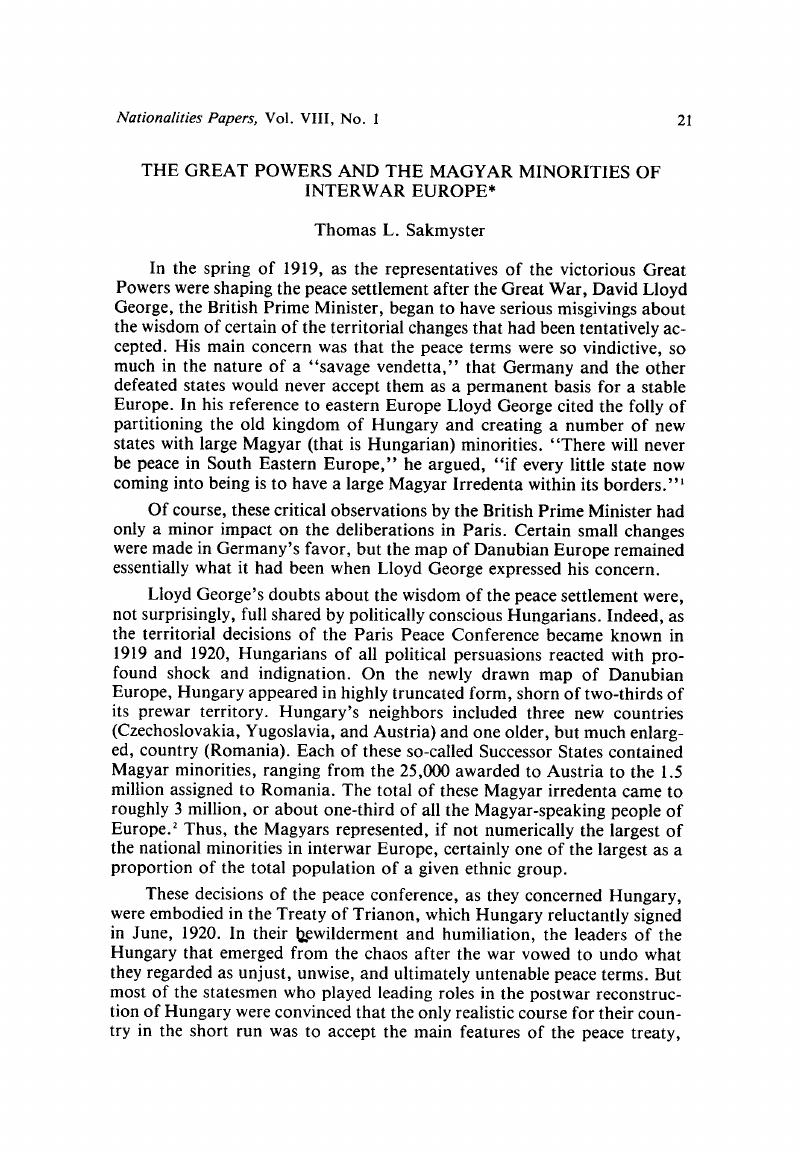No CrossRef data available.
Published online by Cambridge University Press: 20 November 2018

* This paper was prepared for the 1978 AAASS National convention in Columbus, Ohio.Google Scholar
1. Gilbert, Martin, The Roots of Appeasement (New York, 1966), pp. 189-96.Google Scholar
2. Macartney, C.A., Hungary and Her Successors. The Treaty of Trianon and its Consequences, 1919-1937 (London, 1937), pp. 1–6.Google Scholar
3. On the relationship of Hungary and the Little Entente countries, the most comprehensive study is that of Magda Ádám, Magyarország és a kisantant a harmincas években (Budapest, 1968).Google Scholar
4. Borsody, Stephen, The Tragedy of Central Europe (New York, 1962), pp. 72–83.Google Scholar
5. Gooch, George Peabody, Under Six Reigns (New York, 1958), p. 316.Google Scholar
6. Nándori, Pál, “A Lord Rothermere akció” A Budapest Eötvös Loránd Tudományegyetem Állam-és Jogtudományi Karának Áctai, 10 (1968): 91–118.Google Scholar
7. Information on this episode can be found in the Public Record Office, London (cited hereafter as PRO), Foreign Office (F. O.) 371, C10897/395/21.Google Scholar
8. Gilbert, , Roots of Appeasement, p. 122.Google Scholar
9. PRO, F. O. 371, C9296/942/21.Google Scholar
10. Minutes, British Cabinet meeting, 19 September, 1938, PRO, Cabinet Records, 23-95.Google Scholar
11. Deák, Francis, Hungary at the Paris Peace Conference. The Diplomatic History of the Treaty of Trianon (New York, 1942), pp. 45–47, 69-70.CrossRefGoogle Scholar
12. See, for example, Cornish, Louis, The Religious Minorities in Transylvania (Boston, 1925).Google Scholar
13. McKenna, Marian C., Borah (Ann Arbor, 1961), p. 275. See also the New York Times for Oct. 24, 25, 26 and Nov. 22, 1931.Google Scholar
14. Burks, R.V., The Dynamics of Communism in Eastern Europe (Princeton, 1961), pp. 154-55.CrossRefGoogle Scholar
15. See Diplomáciai iratok Magyarország külpolitikájához 1936-1945 ed. Zsigmond, László (Budapest, 1965), vol. 2, no. 553.Google Scholar
16. Macartney, C.A., October Fifteenth. A History of Modern Hungary, 1929-1945, 2nd ed., 2 vols. (Edinburgh, 1961), 1:301-2.Google Scholar
17. Sakmyster, Thomas L., “Hungary and the Munich Crisis: The Revisionist Dilemma,” Slavic Review, 32, no. 4 (1973), pp. 725-26.Google Scholar